Once you have a Bible that you want to study and learn from, it is time to figure out how to use it. We covered what is in the Bible in a previous lesson, but didn’t suggest where to start reading to help you learn and grow the most.
You can start at the beginning with Genesis 1:1 and start reading from there, but that is not the best way to learn. You need to decide what you want to study and then go from there.
Pray
We will be covering prayer in a future lesson but know that prayer is an important part of your Bible study time. You are going to want to pray before you study and ask the Spirit to guide you in your learning process.
Here’s an example of what you can pray:
“Lord, Prepare my heart to receive Your message. Help me to set aside the distractions of life so that I can focus on what You want me to learn today. I ask the Holy Spirit to reveal Your Truth to me today. Amen”
The Gospels
As a new believer, you probably want to start with the Gospels. These are in the New Testament and consist of Matthew, Mark, Luke, and John. They are the first four books you will find in the New Testament. Matthew, Mark, and Luke are sometimes called the Synoptic Gospels because they have a lot of similarities. But each was written to a different audience.
- Matthew was written to the Jewish people so includes things like the genealogy of Jesus since that was important to them in waiting of the long-awaited King.
- Mark is one of the shorter of the four gospels and was written to the Gentile (non-Jewish) Christians, specifically those in Rome. It does more to explain Aramaic expressions and Jewish customs than other gospels.
- Luke was written to Gentile Christians, too, but not in Rome. It was addressed more to those Paul had preached to.
- John is different from the other three gospels and is often a favorite of believers for his style and message. It was written to both Jewish and Gentile Christians with a more universal message. It is a great place to start if you are new to the Bible.
While the gospels all have similar messages, each has elements the others do not, and some explain events in more detail than others. You should try to read all four books to help you get a complete understanding of who Jesus is and what He did for us. You can think of them like journals – each author had a different perspective when telling the same stories.
Context
It is important not to take things out of context when reading and studying. For example, you will remember in lesson one there were a LOT of verses in parenthesis after various points. Those references are provided to help you understand the reasoning behind the statement prior (to validate the point from the Bible). You should look up references and read the verse yourself. But don’t stop there. Read at least a few verses before the reference and a few verses after so that you can get a better understanding of the intended message. It is easy to take things out of context and misunderstand.
To best understand, you should read an entire chapter or an entire book of the Bible instead of just one or two verses. Then read it again. Repeated readings help you to understand the intended meaning and help you to see things you might have missed on the previous read through.
If your Bible includes study notes or book introductions, read those, too. Get a better understanding of things like who wrote the book you are reading, who they wrote it to (audience), the time frame it was written in and what might have been going on historically in that time and area, and the culture. Understanding these things is not a requirement, but it helps you to better make sense of what you are reading.
Take Notes
Bible study should be fun and informative for you. You want to learn and grow. Therefore, you should take notes as you go. You can do this in a notebook or in the margins of your Bible (though some people do not like writing in their Bibles while others underline, highlight, and scribbles notes everywhere).
Write down questions you have and then see who might be able to answer those questions for you (or google them and see what you can find. Just be cautious about where you find answers online. You want something that is Biblically sound and Bible based).
Study with Others
The best way to learn is to join a bible study group or small group. That allows you to ask questions, hear questions others ask, and learn from the group members. Don’t be shy. Ask questions and get answers. You want to participate. Don’t think that just because you are struggling to understand something or the fact that you are newer in your faith keep you from participating. Everyone starts somewhere. Some are more advanced than others because they have been studying longer. But even those people have questions! Ask!
Tools and Resources
There are a TON of tools and resources available to help you with your study time. But remember, you don’t have to spend a small fortune to help you learn. There are just as many free resources as there are paid ones.
If you do want to invest in anything, consider a good Bible Dictionary before anything else. This will allow you to look up terms and get a better understanding of things you might come across during your study time.
You can check out tools and resources from your local library, too. No need to buy something you can borrow, right? Speaking of borrowing, you probably have friends or church leaders who might be able to lend you study tools, too.
The best assortment of tools and resources can be found online.
- BibleHub.com has a little bit of everything – commentaries, study notes, side by side version comparisons, Sermons, topics, outlines, timelines, lexicons, and more. It is an amazing resource for study time and is completely free.
- BlueLetterBIble.com has a lot of online tools and resources built in, as well. Plus, there is a Help section to guide your search.
- GotQuestions.org is a great website to hop on when you have a specific question. They answer questions about God, the Bible, theology, passages, Scriptures, and more. If you have a question, someone probably already asked it and the answer can be found on this website.
- BibleResources.org offers many of the same tools as the others.
- BibleProject.com is another with great resources you can use for free.
- And many more!
Study Strategies
Just like the plethora of Bible options, available tools, and online resources, you will find just as many strategies to guide your study time. Experiment with different strategies. Find what works best for you and your learning style.
What follows is a list of a few different study strategies you might want to try out. The list is not all inclusive. There are many other strategies you can try if you are not pleased with these.
- Bible Study Books: You can buy books online or at most bookstores that walk you through character studies, topical studies, or studies of specific books of the Bible.
- SOAP Method: SOAP is an acronym for Scripture, Observation, Application, and Prayer. You go through each step for what you have decided to study. For example, if you choose to study the first few verses of the book of John you would write down the verses under S, record your own observations and thoughts under O, then record how it applies to your life or how you can take it and apply it in your life under A, and then end with a prayer for P.
- Selah Method: Selah is also an acronym, like how you use SOAP. Selah stands for Sit, Engage, Listen, Apply, Heart. Sit – find a quiet place to sit and focus on your study, Engage – read and journal/take notes, Listen – Listen for God to speak to you, Apply – apply what you learned to your life, and Heart – allow God to change your heart.
- A.P.P.L.E. Method: Another acronym for studying. A – Attributes of God, P – Promises of God, P – Principles of God, L – Lessons learned, and E – examples to follow.
- REAP method: R – Read, E – Examine, A – Apply, and P – Pray
- FEAST: Focus, Engage, Assess, Spark (identify key verses), Turn (prayer)
- And tons more! Try looking for Bible Study Methods on Pinterest and you’ll find plenty to choose from.
Study Questions
- Why do you think it is important not to take things out of context?
- Why is it beneficial to study with other people?
- Why should you take notes while studying?
Think About It
Look over the various strategies for studying. Which strategy do you think would meet your needs best? Why did you pick that strategy?
Discipleship Program Index | Lesson 4 | Lesson 6


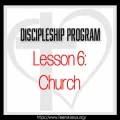
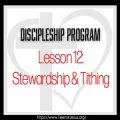
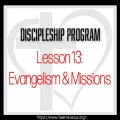
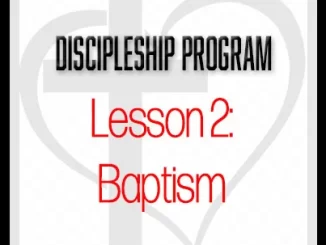
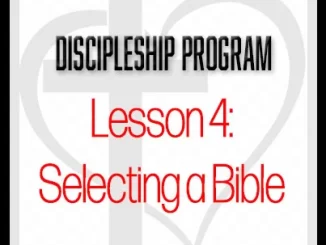
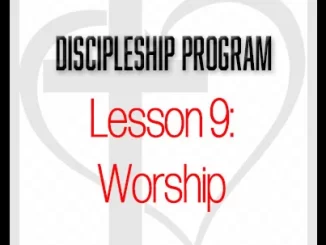
Be the first to comment